817 Search Results for praactical teaching
April 20, 2013
by Carole Zangari -
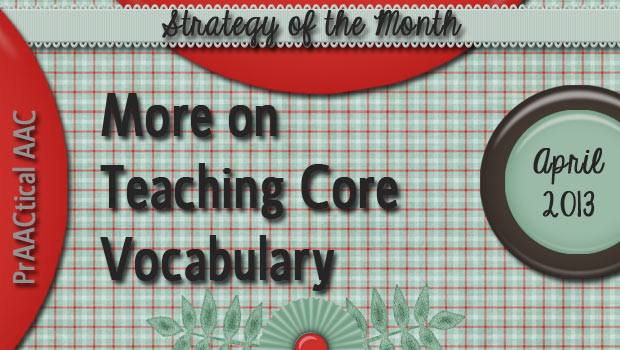
Last week, we talked about two key strategies for teaching core language: using aided language input and creating frequent opportunities to teach and elicit core words. In today’s post, we’ll expand the number of words and discuss two additional considerations for teaching core words. Aided language input is always important in working with beginning users of AAC. It exposes them to their new means of communication, provides them with a competent model of their AAC system, and introduces them to words and symbols they don’t yet know within a meaningful context. It also forces us to slow down when talking, something that can be very beneficial when you consider that many beginning users of AAC also have difficulty processing oral language. (It may take them longer to decode what they’re hearing and they may have to concentrate more than the average kid.) If you’ve actually tried pointing to symbols as... [Read More...]
April 8, 2013
by Carole Zangari -
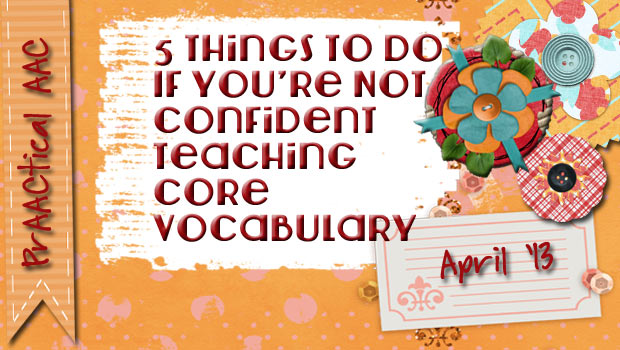
New to teaching core vocabulary in AAC? On board with the concept? Know that it’s important but find it a little intimidating to teach? Welcome to the club! Actually, it’s quite a big club but you wouldn’t know it because lots of members are still closeted. That’s okay – no one here is going to ‘out’ you. But if you want to move forward in your AAC teaching journey, here are some things to try. Breathe and forgive yourself: It’s easy to feel like everyone else knows this but you. Not true. We tend to beat ourselves up for not being out ahead of the curve, but you know what? It’s not worth it. We’re all a work in progress, so let it go and just start where you are. As one of our favorite eminent scholars** has repeatedly said, “When you know better, you do better.” Get your own... [Read More...]
April 6, 2013
by Carole Zangari -
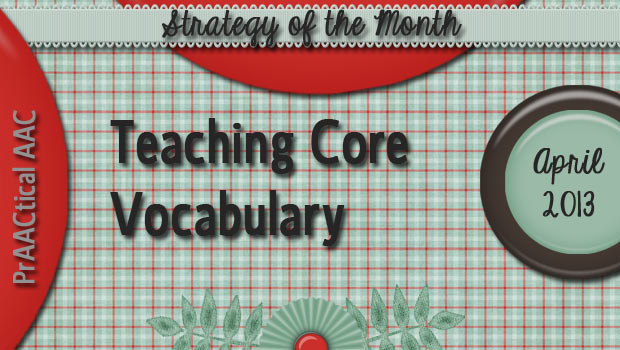
Among the many changes that the AAC field has experienced in the last decade is the notion that core vocabulary is (or should be) an integral part of any AAC system. We grew to understand the limitations of AAC supports that consist primarily of nouns and descriptors, realizing that those kinds of communication displays restricted our clients to requesting and labeling. Our field realized the inadequacy of providing only prestored messages (e.g., limited the client’s ability to communicate anything novel, not flexible enough to meet most communication needs, etc.). In essence, we realized that without core vocabulary, we were imposing a ceiling on language development. We’re thrilled to see so many communication boards, books, SGDs, and AAC apps reflect this knowledge. Having tools with the appropriate vocabulary is a big step in the right direction. But to really shatter the ceiling of language development, we have to be good at... [Read More...]
March 22, 2013
by Carole Zangari -
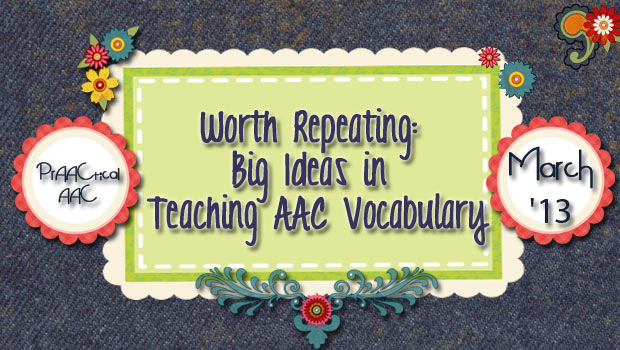
March 9, 2013
by Robin Parker -
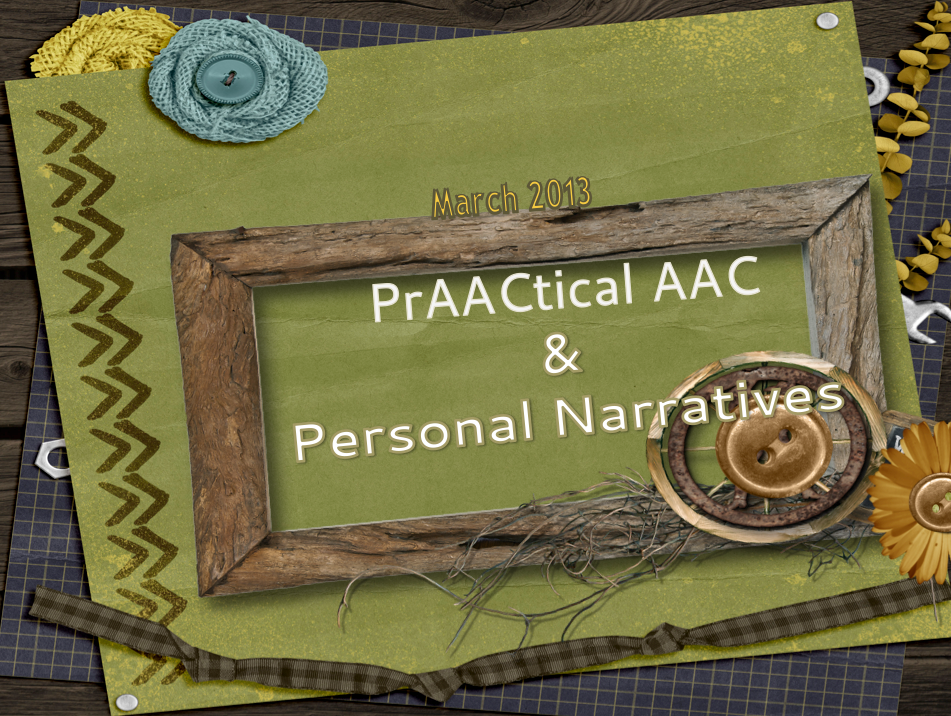
Personal narratives are the first story skills that develop. They tell about ourselves and our connection to activities, places, and events. They tell about how we feel about people and experiences. Personal narratives help us structure and organize the events of our lives and even become a way of thinking about ourselves and our identities. We know many AAC users have significant difficulty with narratives. We always wonder though, is it a function of language difficulty or of access, exposure, and PrAACtice or more likely a combination. There are key intervention strategies that help AAC learners be able to tell personal narratives. You probably won’t be surprised by what strategies work but the research from Gloria Soto and colleagues has shown us that when applied to personal narratives, AAC users can be competent story tellers. Some Thoughts on Personal Narrative Assessment Even before assessment of the AAC learner, in all fairness,... [Read More...]
March 8, 2013
by Robin Parker -
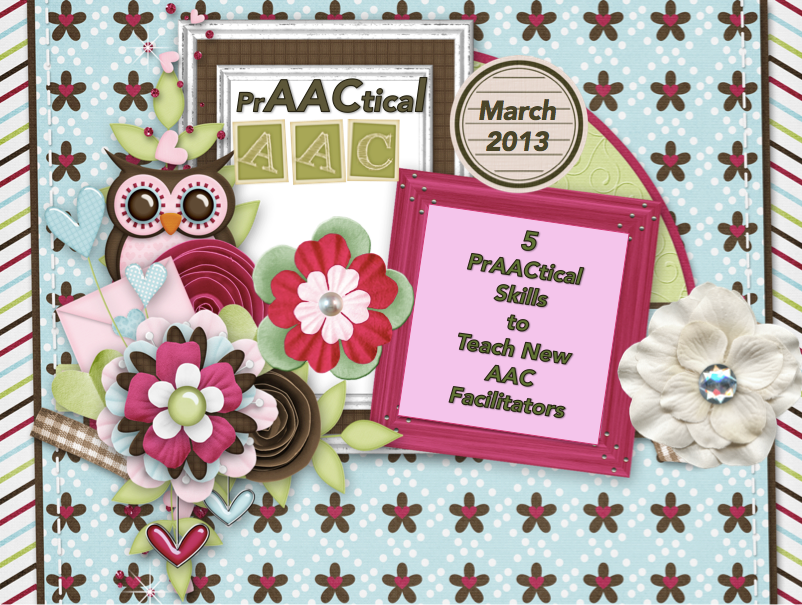
We have been out and about in our community these past couple of weeks. We have worked with speech-language pathologists, teachers, resource specialists, paraprofessionals, and families. We love doing AAC facilitator training because the impact is so important for not only our current AAC learners but for future AAC learners as well. There are really great professionals who want to provide the best AAC support possible. They want and need AAC information that will help them integrate AAC facilitation strategies into their already very busy days. Here are 5 AAC facilitation strategies that have made the most impact: Using Aided Language Input (ALI)– Talk AAC to the learner. This strategy is not only a very powerful teaching tool, but when discussed with new AAC facilitators, seems to make perfect sense (many have never heard of it). One key for learning ALI is to practice it in a variety of activities... [Read More...]
March 6, 2013
by Robin Parker -
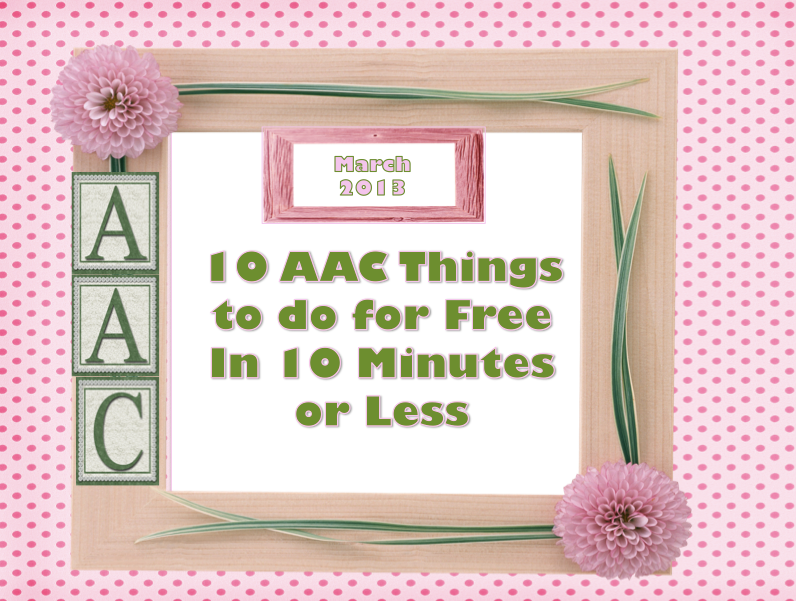
Subscribe to a blog with an AAC focus– Spectronics Blogs, Uncommon Sense, Jane Farrall Consulting, PrAACtical AAC Program a one hit message device and use it for a new reason– 101+ Things to do with a Big Mac or Other Single Message Communication Devices Follow an AAC topic Pinterest board– PrAACtical AAC, AAC by Katie Ahern, AT/AAC/Adapt/Modify/Accessibility/Accommodations, AT for Communication, AAC by Constantly Speaking, Communication-AAC Print out and hang up or give someone an AAC Awareness Image– 10 Commandments of AAC Devices, AAC It’s as Easy as 1,2,3 Register for a free AAC professional development webinar from Ablenet Print out an AAC Poster– AAC Boot Camp-Getting AAC Users to Communicate, The Periodic Table of AAC, Learn about technology and apps for AAC and learning from Pinterest– Lauren Enders Pinterest Boards, Tech in Special Education Print out song visual supports Read a Tar Heel Reader Book with an AAC learner... [Read More...]
February 16, 2013
by Carole Zangari -

. A few weeks ago we talked about AAC intervention to teach someone how to convey information that others want or need. Giving instructions, answering comprehension questions, and retelling a story all fit into the Light’s category of ‘information transfer.’ Communicating in order to give information is only part of that story. Today, we complete the story by talking about getting information from others. Not all questions are about getting information, of course. We also ask questions for other reasons, like getting something we want or need (e.g., “May I have a drink, please?”) and socializing with friends/family (e.g., “How was your weekend?” “What did you do for your birthday?”). But in this post, we focus on interrogatives that serve the purpose of getting needed information from a communication partner. Many times when we think of interrogatives in language therapy, the focus is on answering them accurately and appropriately. The skill... [Read More...]
February 7, 2013
by Carole Zangari -
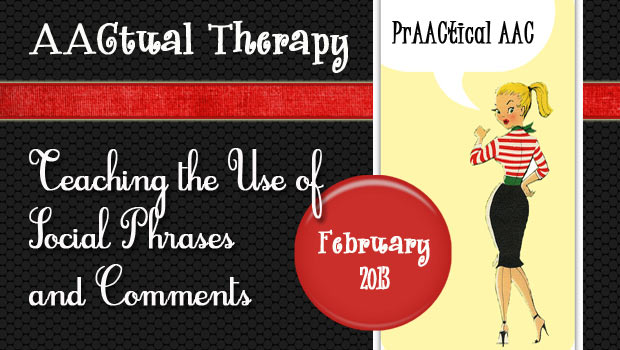
We are so happy to have Deanna Wagner back with more AACtual Therapy. In her previous post, Deanna talked about her work with AAC groups for adults. Today, she shares a lesson plan and some implementation ideas. As a veteran AAC interventionist, Deanna’s therapy plan has many wonderful features that undoubtedly contribute to the success her students experience. Lesson/therapy Session: Using Social Phrases/Comments Intended audience & type of AAC: All devices/AAC users should have access to social commenting. Our Class: Middle school, self-contained classroom. Group of 3 students, SLP leading activity, paraprofessional, and Teacher of Visually Impaired supporting Goal for Overall Lesson: Use word/icon combinations to express opinions or make social comments Specific Student Goals: Student #1 will combine 2 icons for social interjections – please, thank you, cool, awesome, yum, yuk, ok (ECO2 from PRC) Student #2 will functionally use new phrases to chat or indicate an opinion (Dynavox... [Read More...]
February 5, 2013
by Robin Parker -
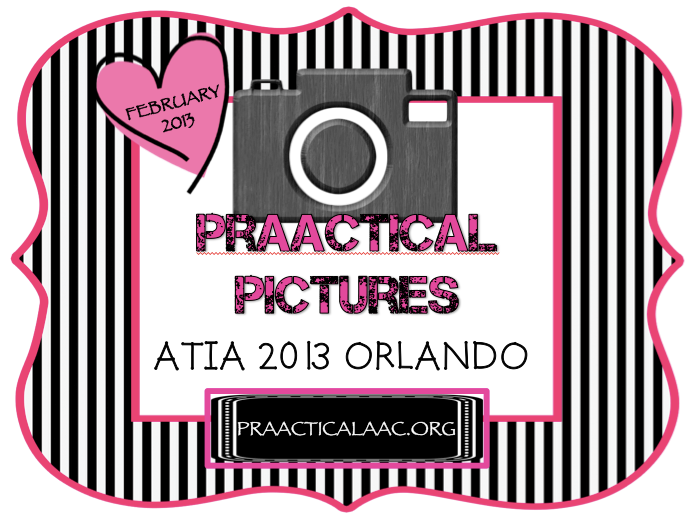
All we can say is Wow! ATIA 2013 Orlando was awesome! Since it is February, we will focus on things we LOVE as it relates to our ATIA experience. Here are just a few thoughts and pictures from our time in the Exhibit Hall. (Please note, this is just a small sample of the many, many things seen and learned. Our list is based on the pictures we took and the time we had in the Exhibit Hall (both limited). A comprehensive list of Exhibitors can be found at the ATIA 2013 Orlando Site under the Exhibit List. So much to see and learn! FRS Custom Solutions.- We loved meeting the FRS Team (especially since they are based in Fort Lauderdale) and learning about the CommLink ProSlate Series. Fat Cat Chat– Love the Fat Cat Chat apps for ‘small talk’ (Thanks Jane Farrall for blogging about Fat Cat Chat apps). Immediately... [Read More...]









